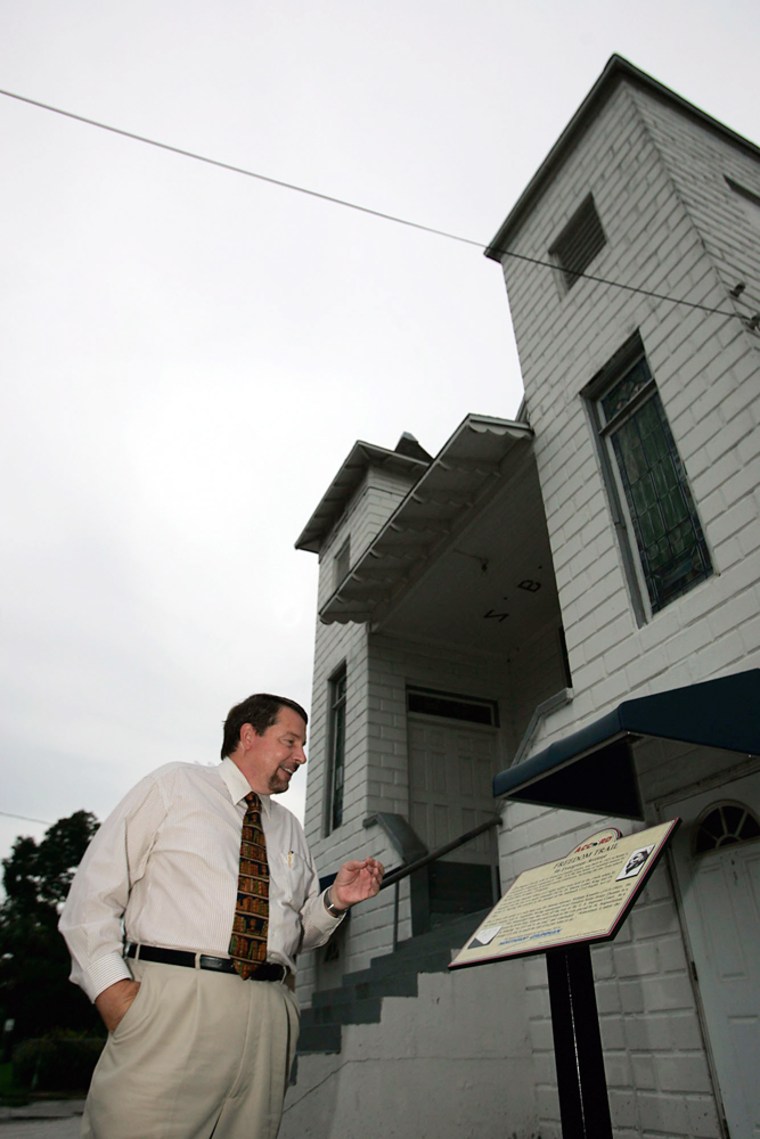Lillian Roberson was about to doze off when she heard a car pull up outside her home. Her husband, Bungum, and her four young sons were asleep.
When she got up to check, the back of her home was ablaze — a firebomb had been thrown inside, likely by the Ku Klux Klan. She and her husband were able to get the boys out safely, but their home was destroyed.
The Feb. 7, 1964, attack was aimed at intimidating the Robersons — the black family had begun sending their children to a previously all-white elementary school. All that remains today of their Victorian home are three moss-covered brick steps.
Hours later the Klan apparently struck again — someone shot up the home of a prominent black activist, dentist R.B. Hayling.
But the attacks had an effect the perpetrators couldn't have anticipated — it turned the sites into monuments. Both are among 10 now designated as part of the Freedom Trail, a series of historical landmarks in St. Augustine significant to the civil rights movement.
Included are the home where the Rev. Martin Luther King and the Rev. Ralph Abernathy stayed while in St. Augustine while leading demonstrations that led to the passage of the Civil Rights Act of 1964; the former downtown Woolworth's store where lunch counter sit-ins were staged; and the state headquarters of King's Southern Christian Leadership Council. David Nolan, a local historian and author, did the research on the sites for the 40th ACCORD, a grass-roots civil rights commemorative group, and hopes to add another 20 more markers if funding can be found.
"This isn't about black history. This is underexposed American history," said Rick Matthew's, vice president of Northrop Grumman Corp. The aviation company, which has a large plant near town, paid $1,000 each for the markers.
The Robersons were raising their boys on Gaunt Street, a narrow road of homes in the northern part of the nation's oldest city, just blocks from the famed "Fountain of Youth."
Bungum Roberson worked at the local Ford dealership, a job he lost after his home was destroyed.
A cold, stiff February northwesterly wind was blowing the rain. The Roberson boys, ages 3, 5, 7 and 10, were asleep when the large dark car pulled up outside the house, its lights off.
Lillian Roberson peered out the window, but couldn't see much, so she got up to investigate.
That's when she saw the flames burning in the back of her house.
"It was burning and burning, real fast and real quick," she recalled in a recent interview with The Associated Press.
"If it wasn't for God, we wouldn't be alive," she said. "I was terrified. They boys were really small and I was concerned about them."
Roberson said the family stayed until the end of the school year, moving to Philadelphia and then back to Jacksonville.
About two hours after the Roberson home was torched, Hayling was at home with his pregnant wife and two young daughters, when gunfire rang out.
Hayling served as an adult adviser to the NAACP Youth Council and for 11 months as head of the St. Augustine chapter of the Southern Christian Leadership Council.
The bullets, which perforated many of the home's walls, came close to killing Mrs. Hayling and it killed the family pet, a boxer named Madonna. Hayling loaded up his family and took them to Tallahassee for safety.
Hayling was a visible and hated troublemaker to the Klan and local group of lawless marauders, led by Holsted "Hoss" Manucy, who fought integration with his Manucy's Raiders.
At a Klan meeting in September 1963, the Rev. Connie Lynch, a traveling racist evangelist, urged violence against Hayling, according to the book "Hooded Americanism: The History of the Ku Klux Klan."
Author David Chalmers, a retired University of Florida history professor, refers in the book to a report by a white minister named Irvin Cheny, who quoted Lynch's remarks about Hayling.
"He's got no right to live at all, let alone walk up and down your streets and breathe the white man's free air. He ought to wake up tomorrow morning with a bullet between his eyes. If you were half the men you claim to be, you'd kill him before sunup."
Five months later, shots were fired into his home.
In a telephone interview from his home in Lauderhill, Hayling, now 77, talked about the fear and hatred that ran rampant in the summer of 1964, when King brought his demonstrations to a community that was preparing to celebrate its 400th birthday.
On another occasion, Hayling and three other men were kidnapped as they spied on a Ku Klux Klan rally. They would have been burned alive if the Florida Highway Patrol had not arrived. Hayling was hospitalized for 14 days, losing 11 teeth and he had several broken ribs.
Hayling worried that he would pay a high price for his activism.
"I was fighting for freedom and fighting for the rights of citizens," he said. "If my life was the price I had to pay, I would pay it. Dr. King and the Kennedys paid the price, Medgar Evers paid the price."
But although he still thinks St. Augustine, Florida and the country can still improve the plight of blacks, he is proud of his work.
"We helped to do something for America with the passage of the Civil Rights Act," Hayling said.
